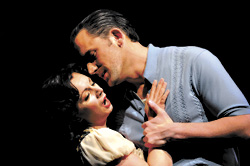Perhaps overly intent on giving the audience its money’s worth, Seattle Opera tinkered a bit to transform Leoncavallo’s one-CD opera Pagliacci into a full evening’s entertainment. Set among a troupe of commedia dell’arte players—Nedda is married to Canio, trysting with Silvio, and coveted by Tonio, who, rejected, rats her out with tragic results—Pagliacci is rarely performed outside a double bill. But SO has added a brief mimed dream sequence, depicting Nedda and Canio’s youth, between the two acts. It’s a charming but unnecessary idea by director Bernard Uzan that doesn’t seem to have been fully thought through, an attempt at a backstory that puzzles more than it enlightens. Set to music deftly sewn together by Philip Kelsey from other Leoncavallo works, and featuring three local circus-arts performers (ungraciously billed only in tiny type in the program), the scene raised the question: Why acrobats in the flashback and commedia dell’arte actors in the opera’s present? And did the third acrobat represent Tonio or someone else?
Given that this scene made his character’s character more, not less, confusing, Gordon Hawkins does quite well as the physically and psychically wounded Tonio. He starts as an echo of Lucien—the lumpen, lumbering, Princess Diana–besotted grocer’s assistant in Amélie—and morphs into Iago. In past SO roles, Hawkins’ voice has sounded imposing and virile in Donizetti, early Verdi, and Wagner, but it seems one size smaller against Leoncavallo’s full-throttle orchestration. The 34-year-old composer also set Nedda a treacherous task in her entrance aria: Practically any soprano equipped for the sob-and-throb emoting required by the rest of the piece will be likely to sound harsh against the aria’s sparkling harp-and-piccolo instrumentation (evocative of birds, whose freedom she envies), especially before she’s had a chance to warm up. Nuccia Focile performs admirably, with only a very slight dry edge to her voice.
As Canio, Antonello Palombi musters some rousing, trumpetlike high notes—not too suave, but then neither is Canio. His challenge is “Vesti la giubba,” an aria that suffers from what you might call the “Casta Diva” Curse: one of those numbers that no one is allowed to sing without being compared to everyone else who’s ever sung it. But in his approach to Leoncavallo’s greatest hit, something conversational, a reluctance to belt, gives it a fresh and attractive intimacy. He isn’t singing at us, he draws us in. Morgan Smith, as Silvio, looks the part superbly and acts it convincingly, while giving Focile handsome support, like a ballerina’s secure dance partner, in their love duet. Agile character tenor Doug Jones sings Beppe, the troupe’s jocular voice of reason.
Most of Pagliacci‘s second act is given to the play-within-a-play, during which Canio, driven mad by jealousy, gradually breaks character, frightening his fellow actors and alarming the playgoers—all grippingly staged by Uzan. Cynthia Savage’s 1950-ish costumes are fetching, and lighting designer Donald Thomas conjures a masterful and gorgeous sunset. Dean Williamson conducts boldly, though I’ve heard the Seattle Symphony sound tighter. And since you asked, the ideal pairing for Pagliacci (if played as intended, without intermission) would be Wolf-Ferrari’s 1909 The Secret of Suzanne, an elegant 50-minute comic take on the same jealous-husband premise. I can’t complain about Seattle Opera trying something out of the ordinary, but I think Leoncavallo’s swift melodrama would have worked even better unpadded.







